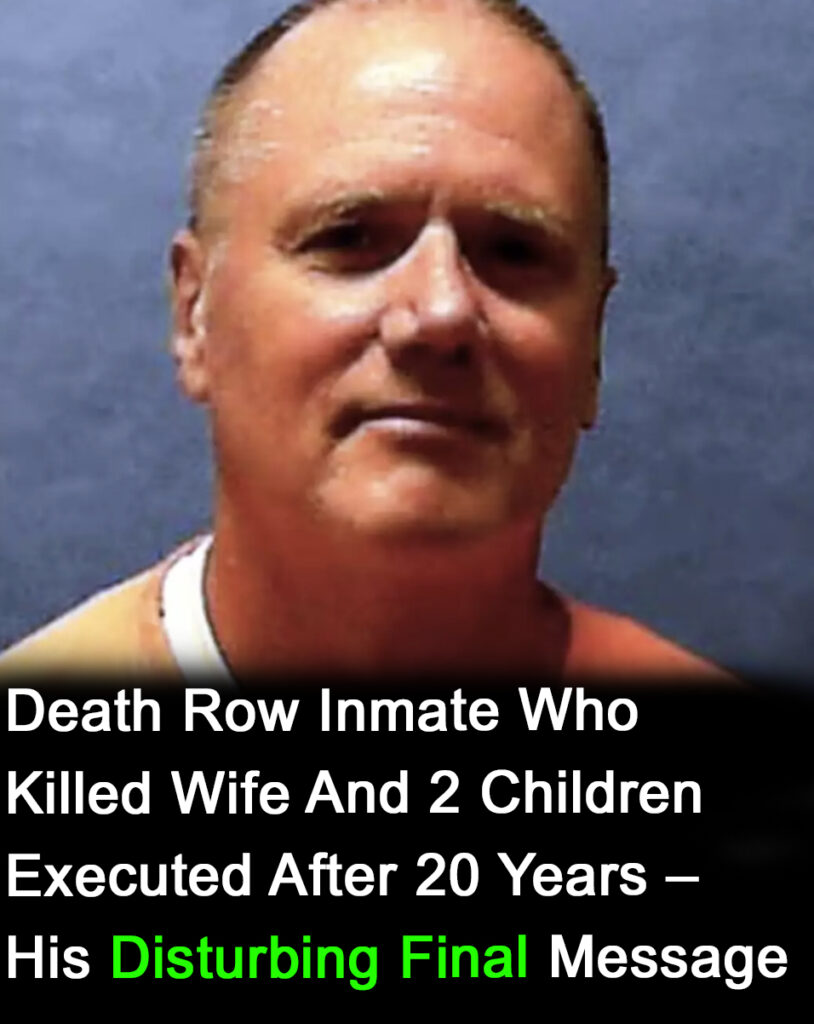Tragic Execution of Edward Zakrzewski: A Dark Chapter in Florida’s Justice System
Edward Zakrzewski, a convicted murderer, faced his fate on July 31, 2025, when he was executed by lethal injection in Florida. His case is emblematic of the ongoing debates surrounding capital punishment in the United States, particularly as it pertains to the emotional and societal implications of such a final sentence. At the age of 60, Zakrzewski became the ninth inmate executed in Florida this year, with two more executions scheduled in the coming weeks. This surge in executions has triggered a wave of concern among advocacy groups and civil rights organizations, drawing attention to the policies governing the death penalty in the state.
The execution was carried out using a controversial three-drug cocktail designed to sedate, paralyze, and ultimately stop the heart. This method has been criticized not only for its ethical implications but also for the fear that it may cause unnecessary pain and suffering. The very notion of capital punishment raises substantial moral questions: is it right for the state to take a life, even in the name of justice? These concerns are compounded by reports of botched executions, which have sparked fiery debates about the efficacy and humanity of lethal injection as a means of execution.
Zakrzewski’s history is as tragic as it is chilling. In 1994, he was convicted of murdering his wife, Sylvia, and their two young children, ages seven and five. This horrific crime shocked the local community and drew national attention, as it represented an extreme manifestation of domestic violence. The brutal slaying of his family is a grim reminder of the dark realities that can exist within the confines of a household. Following the murders, Zakrzewski attempted to evade law enforcement by fleeing to Molokai Island, Hawaii, where he lived under the radar for four months before being apprehended. His capture, following a tip-off, raised further questions about the responsibilities of law enforcement in ensuring that justice is served, particularly in cases involving family annihilation.
The Context of Florida’s Death Penalty
Florida holds one of the most active death penalty systems in the United States. As of 2025, the state has executed a total of 9 individuals in just over half a year, indicating a significant and troubling trend in the application of capital punishment. This frequency of executions poses critical questions about the judicial process and whether it allows for sufficient review and consideration of potential miscarriages of justice. The public, while divided, is increasingly engaged in discussions about the implications of such decisions on a societal level.
Moreover, the methods employed in these executions have attracted scrutiny. The three-drug protocol used in Zakrzewski’s execution has been criticized for its potential to cause unnecessary suffering. Numerous botched executions in recent years have prompted discussions about the ethical implications of lethal injection and whether current practices can be deemed humane. Critics often argue that the shift towards pharmacological methods of execution is an attempt to sanitize the process of killing, further distancing society from the raw realities of capital punishment. This ongoing scrutiny reflects a growing awareness of the need for reform within the criminal justice system.
Reflections on Justice, Mercy, and Redemption
Zakrzewski’s execution leaves behind a complex legacy that intertwines themes of justice, mercy, and redemption. While the families of his victims may find solace in the resolution of his fate, broader societal implications remain. The cycle of violence within families is a harsh reality that many communities face, and his story highlights the urgent need for more comprehensive support systems for those affected by domestic violence. The question persists: How can society foster environments that prevent such tragic outcomes and provide avenues for redemption rather than punishment?As the world watches the ongoing discourse surrounding capital punishment, Edward Zakrzewski’s case serves as a poignant reminder of the human stories entwined within the legal process. His life and actions, ultimately culminating in his execution, invite us to reflect deeply on the values we uphold as a society and the structures we create to govern justice. The complexities of his case illustrate the broader narrative surrounding the death penalty, emphasizing the need for careful consideration of both the personal and societal consequences of such severe measures.
In the landscape of American justice, the death penalty remains a contentious issue, one that seems to polarize opinions to this day. Advocates for the abolition of capital punishment argue that it disproportionately affects marginalized communities and fails to serve as an effective deterrent against crime. For many, the loss of innocent lives to violent acts is an unbearable tragedy that calls for justice, yet they question whether the death penalty truly provides that justice or merely perpetuates a cycle of violence. In contrast, proponents assert that it delivers justice for victims and their families, allowing them to reclaim a sense of agency and closure in the aftermath of unspeakable loss.
No matter the stance one takes on the death penalty, it is essential to acknowledge the moral complexities and the profound impact these decisions have on individuals and communities alike. The case of Edward Zakrzewski serves as a chilling reminder of the extreme outcomes of domestic violence and the societal failures that allow such tragedies to occur. As discussions around capital punishment continue to evolve, it is imperative that we not only advocate for justice but also seek to understand the underlying issues that lead to such catastrophic events in the first place.

















